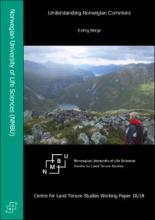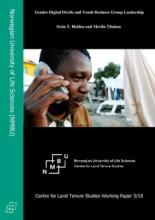Land Library
Bienvenue dans la bibliothèque du Land Portal. Explorez notre vaste collection de ressources en libre accès (plus de 74 000), comprenant des rapports, des articles scientifiques, des articles de recherche, des publications évaluées par des pairs, des documents juridiques, des vidéos et bien plus encore.
/ library resources
Showing items 19 through 27 of 381.The paper reviews the development of the legal status of Norwegian commons from the first known legislation on commons. The development can be divided into 5 periods.
We assess the gender difference in mobile phone ownership among youth business group members, and how it affects election into leadership and group board positions in recently established rural youth business groups in northern Ethiopia.
The paper assesses risk tolerance, trust and trustworthiness among male and female youth group members in recently formed primary cooperative businesses in Ethiopia. Male members are found to be more risk tolerant, trusting and trustworthy than females.
We investigate the extent of variation in output sharing in land rental contracts and alternative hypotheses to explain this variation. Close to half of the rental contracts in our study in northern Ethiopia have output shares that deviate from the dominant 50-50 equal sharing.
The Land Consolidation Act has recently been revised. The changes came
into force on 1 July 2006 and 1 January 2007. The main changes in the Act are that
the land consolidation court now has formal jurisdiction to handle land consolidation
This study utilizes land registry data from the First and Second Stage Land Registration Reforms that took place in 1998 and 2016 in sampled districts and communities in Tigray region of Ethiopia.
This study investigates how the Farmer-to-Farmer-Extension (F2FE) system with lead farmers and follower farmers influences adoption of Conservation Agriculture (CA) technologies in Malawi.
Youth unemployment and migration are growing challenges that need more political attention in many countries, particularly countries with rapid population growth and economic transformation.
We use four waves of panel data from Northern Ethiopia to investigate the link between Food for Work (FFW) participation and the diversity of food consumption and production.









